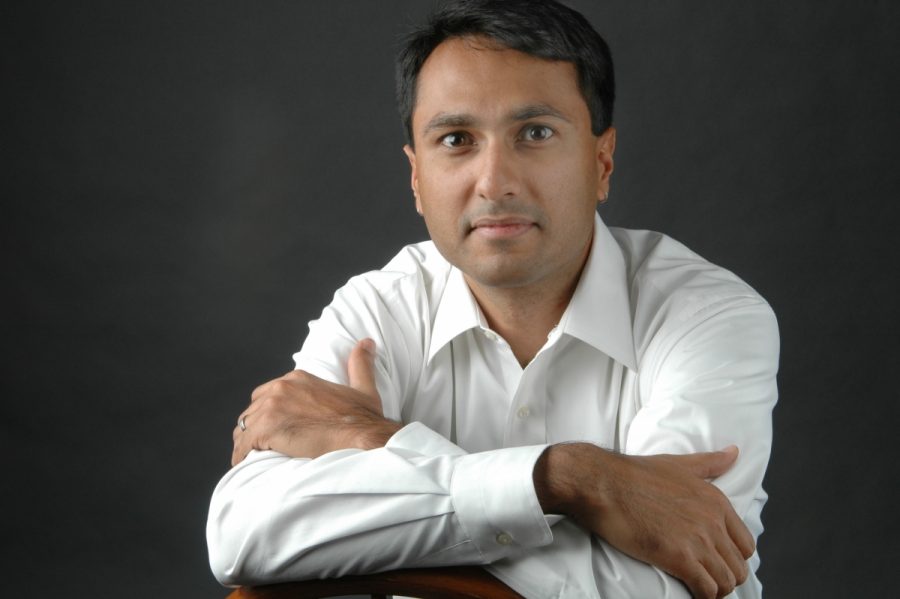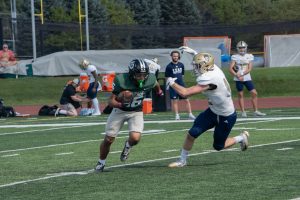Q+A Interfaith Youth Core founder, White House council member, COD alum: Eboo Patel
October 12, 2016
For COD’s 50th anniversary, two successful alumni authors, Leigh Stein and Eboo Patel are returning Oct. 13 for a Writers Read event. Patel shared his excitement, explained his work for President Barack Obama, and work for his own organization, explaining how it all began at College of DuPage.
Caroline: Can you tell me about your organization Interfaith Youth Core?
Eboo: I am the founder and president of it. It was the recognition of the importance that religious diversity played in America, and the fact that there was relatively little attention given to religious diversity matters in educational institutions. It began with personal observations. I had a very religiously diverse group of friends in high school, but we almost never talked about religion together even though it was somewhat an important part of all of our lives. Getting to college at the University of Illinois, and being a part of the diversity discussion there, there was very little mention at all of diversity. So it was that range of things that caused me to found the organization.
C: What are the types of things the organization does for youth?
E: It’s in Chicago, but we work nationally. What we really do is work with college campuses. So we help college campuses design curriculum, interfaith studies courses, and academic programs. We do training for students to become what we call, “Interfaith Leaders.” We help colleges create interfaith strategic plans. Those are just some of the things that we do. At Dominican University, we helped them launch a minor in interfaith studies. That minor will give you the diversity of religious traditions in the western suburbs of Chicago and help you become a professional when it comes to dealing with religious diversity.
C: What book will you be discussing at Writers Read, and what can students expect?
E: I’ve written three books: “Acts of Faith,” “Sacred Grounds,” and my recent book, “Interfaith Leadership.” What I’ll probably talk about is how America is a diverse democracy, the challenges of that, and what it means to be a leader within a diverse democracy. “Acts of Faith,” is the most personal book along those lines, talking about my own coming of age story, which includes my time at COD. The basic theme of America as a diverse democracy holds true across my three books.
C: Have you always wanted to publish your work?
E: Yes, writing has always been a part of my identity. Wanting to be a writer has always been a part of my identity. I took writing assignments in school very seriously. I never viewed them as something just to get done, I always viewed them as something to excel at, to try to make my writing as clear as possible, as compelling as possible, and, frankly, as beautiful as possible. I got a great piece of advice from my AP English teacher at Glenbard South High School who said, “Don’t wait until the last minute to start a writing assignment. Start thinking about it right away. Start turning the wheels in your mind on the assignment right away.” Writing is not just putting words on a piece of paper. Writing is continually polishing, continually tightening. So I just made that a part of my craft, if you will. I wrote a lot of things before anything I wrote saw the light of day, or the light of publication.
C: Can you tell me about your experience as a COD student?
E: My mom is a professor at COD. So I had the great good fortune of taking classes during summers when I was in high school. I took classes with Allan Carter. I did an independent study with Carter Carol, who was a history professor. I think that what I discovered at COD really was the joy of learning, that because I was doing it for personal enrichment, it didn’t feel like a grind. It didn’t feel like simply focusing on something to do well on the test. It felt like focusing on things to get the most educational enrichment as possible out of it.
Side note: Patel would like to attribute Werner Krieglestein as a favorite professor.
C: What was your independent study like at COD?
E: it was a study on crime and the economy in the early 20th century. I have no idea how I found it, and neither did Professor Carol. But again, it was the notion of not having to get by and to do well on tests, but it was a place to really care about, to develop intellectual abilities and appetites. That’s what I learned at COD. When you’re at high school, even an excellent high school like Glenbard South, you’re in a system that guides you towards something of a rat race of taking classes and doing well on tests, but in college the distinguishing feature about college is the faculty who have found their intellectual passion and see themselves as having to nurture students into that intellectual passion, and that was revelatory to me. It was hugely inspiring. This notion of not reading a book to do well on a test, but reading the book for the love of reading the book.
C: What was your experience like working on one of President Obama’s councils?
E: I was appointed by President Barack Obama to the inaugural faith council in the year 2009. I served on that council for a year. A big part of what I did there was to elevate the priority of interfaith cooperation on college campuses. We helped the White House launch a program called the “President’s Interfaith and Community Service Campus Challenge,” which was over 500 campuses over the past six years. President Obama, when he was a young man in Chicago, did a lot of work organizing different religious communities, so that bringing different religions together can serve the common good. I think that he had an inclination to support work in that area. Interfaith Youth Core, my organization, by that time had gained a great deal of traction on U.S. college campuses, and I just think President Obama took notice and wanted to support something that he thought was good for the country.
C: Advice from a successful past COD student to a current student?
E: Take advantage of the excellent faculty at the College of DuPage. As I said earlier, they have found their intellectual passion, and a big part of it is that they see their job as helping you find your intellectual passion. Take advantage of that. The second thing I would say is find what you love and view it as a craft, which is to say something to get very, very good at. Whether it’s nursing, or teaching, or social work, or business, view your future profession as something you both love and want to excel at. I consider myself enormously fortunate to have been a student at COD., I have great admiration for the institution, for its faculty, for its staff, for its students, and I am honored to be back for this event.




















